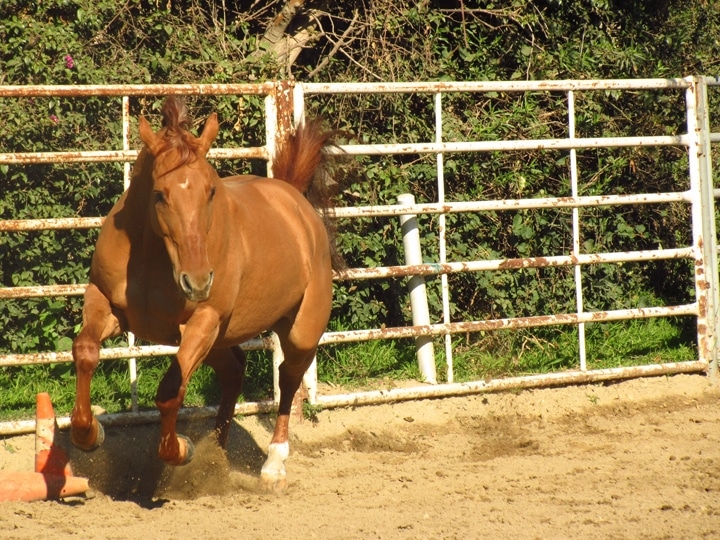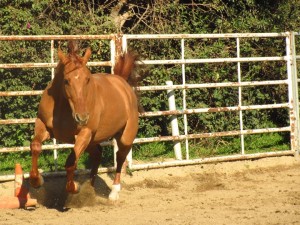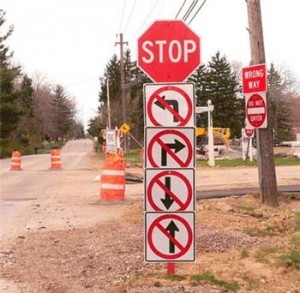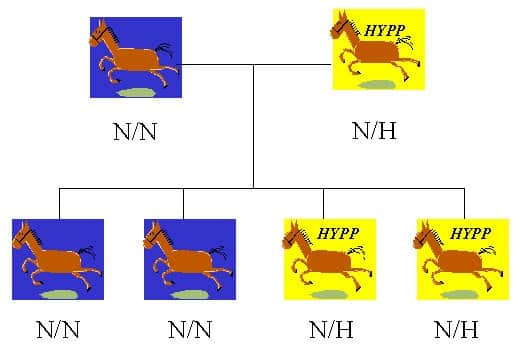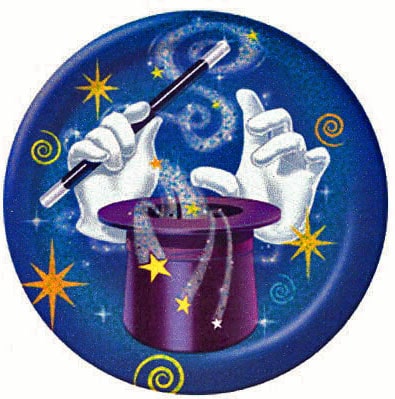“I can always tell which is the front end of a horse, but beyond that, my art is not above the ordinary.” – Mark Twain
I’m pretty constantly amazed at what seems to be a pretty good gap between how healthy horses are and how healthy people think horses really are. I suppose that some of this is understandable. Reading the popular press, various websites, or certain internet chatrooms, one can come away with the idea that a horse’s health is balanced precariously on the edge of an abyss filled with disease and injury, being held back from plunging in only by the fact that the horse owner blankets him every night, has a wide selection of brushes readily available, and is armed with a tack trunk full of supplements.
The truth is that horses are remarkable feats of biological engineering, and they are, in general, remarkably healthy. When left alone, they actually seem to do quite well.
PLEASE NOTE: Horses do not read the popular press, various websites, and they do not participate in certain internet chatrooms. They are apparently blissfully unaware of how unhealthy they almost are, or of how much effort is required to keep them from becoming so.
I mean, look at them in their normal surroundings. These surroundings are pretty simple: grassy areas, with access to water (hopefully). So challenged, they respond by eating plant material for a total of as many as 17 hours a day, and in as many as 23 of every 24 hours in a day, a Herculean feat of appetite that is inconceivable for those of us mammals stuck with a simple stomach (as much as we may wish otherwise). The horse’s digestive system is such that they can get or make all of the nutrients that they need from this remarkably simple diet.
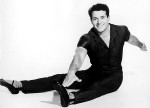 Horses are constantly on the move, which means that they stay in pretty good shape, a shape unequaled by most humans who aren’t (weren’t) also the late Jack LaLanne (if you don’t know who Jack LaLanne was, ask your parents). This combination of a plant-based diet, and regular exercise has conspired to allow horses to run fast, jump high, and be the subject of endless lectures and videos extolling the virtues of their remarkable physiology.
Horses are constantly on the move, which means that they stay in pretty good shape, a shape unequaled by most humans who aren’t (weren’t) also the late Jack LaLanne (if you don’t know who Jack LaLanne was, ask your parents). This combination of a plant-based diet, and regular exercise has conspired to allow horses to run fast, jump high, and be the subject of endless lectures and videos extolling the virtues of their remarkable physiology.
Horses are also social creatures. They travel in groups across the open spaces in mostly pretty parts of the world (those that can support grasses). Good food, exercise, and a nice bunch of friends – sounds like a prescription for health to me! Indeed, prior to humans coming along and building condominiums and freeways across the land, one could easily imagine that horses had it pretty good.
Of course, humans seem to be particularly bad at leaving things alone. Good enough rarely is. For the horse, this has meant that he now gets fed a couple times a day, mostly with dried or processed food, exercised a few times a week, and separated from his buddies. At the same time, removed from the grasslands, he’s packed into small boxes called stables. While this change in surroundings doesn’t seem to immediately jump out as a prescription for health and happiness, especially compared to how they had it before people intervened, horses still seem to get along well in spite of these roadblocks.
And that’s because, insofar as basic biological needs go, nothing has really changed for the horse. He’s still a big creature, who generates a lot of body heat, so he really doesn’t need to be blanketed, especially warm climates, but pretty much anywhere. He still can obtain or manufacture all of his own nutritional needs from his relatively simple diet of any one of a number of hays, so under most circumstances, he really doesn’t need any additional vitamins, minerals, hoof growth promoters, digestive system improvers, etc., etc., added to his feed trough. He will almost always eat like a horse, and look forward to a handful of carrots or apples, no matter how much he’s been recently fed. Eating is what horses are supposed to do!
OTHERWISE STATED: There’s a reason they came up with the term, “Eating like a horse.”
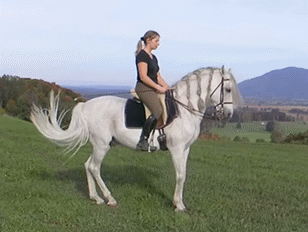
Going nowhere, albeit elegantly.
From a veterinary perspective, I’m not so amazed that I get to see horses that are cut, colicking or lame as I am amazed that I don’t see more problems, given all that people do to them. People seem to be constantly putting their horses into compromising situations, for example, throwing up obstacles for them to jump over, or trying to make them trot in place. I mean, if you put a horse in a ring full of jumps, he’s generally smart enough to go around them, and as for trotting, he normally trots when he wants to go somewhere (even though he usually prefers walking), not when he wants to stand still.
But in reality, horses don’t have very many health problems. Really. The chances of your horse having a serious health problem aren’t very good, especially if he’s in the prime of life (just like you). In that way, It’s like owning a car. Sure, there’s a chance you could have a driving accident when you pull out of the driveway – such things happen every day – but the actual chances of it happening to you are pretty remote. And, if an accident does happen, you deal with it, and move on.
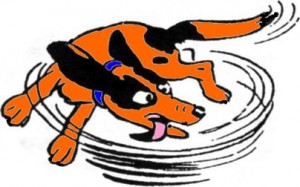 So, you see, your horse is naturally pretty healthy. Unfortunately, lots of people seem not to feel that way. Frankly, I think that much of the anxiety surrounding horse health care is generated by some combination of good intentions, the profit motive, and heavy advertising. Naïve horse owners, anxious to take care of a good friend (and a significant investment of time and money) are understandably concerned that something might go wrong. So, they’ll typically go to great – and expensive – lengths to prevent problems, real or imagined.
So, you see, your horse is naturally pretty healthy. Unfortunately, lots of people seem not to feel that way. Frankly, I think that much of the anxiety surrounding horse health care is generated by some combination of good intentions, the profit motive, and heavy advertising. Naïve horse owners, anxious to take care of a good friend (and a significant investment of time and money) are understandably concerned that something might go wrong. So, they’ll typically go to great – and expensive – lengths to prevent problems, real or imagined.
This concern, of course, is fueled by a bewildering array of products and services that promise to promote, protect, prolong, or improve what is, in reality, a marvelously healthy creature. In fact, it seems a bit of a paradox that in this day where “natural” seems to be the rage, taking care of the horse seems to have developed into such a complicated endeavor, about as far from “natural” as can be. And, to make things worse, all those things mostly do is make it more expensive to own a horse, which I think is a real shame, because if owning horses gets to be too expensive, or too much of a pain, people aren’t going to want to own them.
And what’s really curious (to me, anyway), is that when I tell people that they can save money, that they don’t have to dump their hard-earned cash into the pockets of myriad purveyors of myriad useless products and services, some folks seem to want to say, “Oh, yes we do!” I guess many people don’t want to be told that they’re wasting time and money, although when some one tells me that, I usually say, “Thank you!”
 OFTEN REPEATED QUOTE (variously attributed to Ronald Reagan, Lord Palmerston, Oliver Wendell Holmes, Teddy Roosevelt, Dr. John Abernethy, Will Rogers, and Woodrow Wilson’s physician, Dr. Gary Grayson, among others): “There is something about the outside of a horse that is good for the inside of a man.”
OFTEN REPEATED QUOTE (variously attributed to Ronald Reagan, Lord Palmerston, Oliver Wendell Holmes, Teddy Roosevelt, Dr. John Abernethy, Will Rogers, and Woodrow Wilson’s physician, Dr. Gary Grayson, among others): “There is something about the outside of a horse that is good for the inside of a man.”
So, look, as long as you exercise your horse regularly and reasonably, and feed him well, in amounts appropriate for his health your horse is unlikely to experience many serious health problems for most of his life. (Here’s a hint – if your horse looks good and feels good, it’s probably because you’re mostly doing things right, even if you aren’t spending $200 – or more – a month on supplements and such.) Sure, there are occasional exceptions, but in most cases horses really are as healthy as, well…. a horse!

